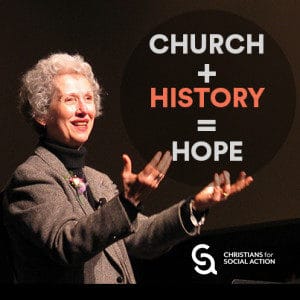When I look at the church, what gives me hope?
In a word, history. A new form of Christian ecclesiology, known today in all its many and varying presentations under the rubric of Emergence Christianity, is rising up around us in just the same way that Protestantism, with its many and varying presentations, did 500 years ago under analogous circumstances, or as Roman Catholicism and Greek Orthodoxy did 500 years before that.
 Each time, what had been, and still was in place, did not cease to be. It had, instead, to re-form and re-evaluate itself in order to learn to speak its message more intelligibly to new times. And, we must note, in the course of each of those prior upheavals, Christianity itself grew and spread. It grew and spread as a direct result not only of the birthing of new expressions of the faith and new modes of its exercise, but also as a result of that re-forming and re-configuring on the part of what previously had been. It will be so this time as well.
Each time, what had been, and still was in place, did not cease to be. It had, instead, to re-form and re-evaluate itself in order to learn to speak its message more intelligibly to new times. And, we must note, in the course of each of those prior upheavals, Christianity itself grew and spread. It grew and spread as a direct result not only of the birthing of new expressions of the faith and new modes of its exercise, but also as a result of that re-forming and re-configuring on the part of what previously had been. It will be so this time as well.
There is one other word that must also be mentioned, however…or perhaps better said, two words: pneuma agion. Holy Spirit. Not since the Day of Pentecost itself and the months immediately following it, have so many Christians so openly and corporately sought the Spirit, engaged the Spirit, laid claim to personal intimacy with the Spirit. We are, in a most dramatic way, moving at last toward a complete and working experience of the Trinity, individually and as the Church at large. And for the hope borne in that, thanks be to God.
Phyllis Tickle is the founding editor of the religion department of Publishers Weekly, an authority on religion in America, a lecturer, and the author of over three dozen books, the latest of which is The Age of the Spirit: How the Ghost of an Ancient Controversy Is Shaping the Church.

